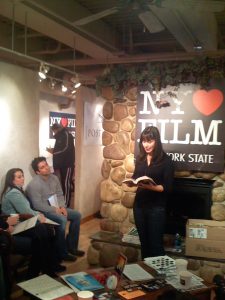From Sundance
I’m reading from my forthcoming novel “Immortal” at the Sundance Film Festival. Specifics: today at 2:30 at the NY Film Lounge, 545 Main Street. The opportunity to do this makes me sound much cooler than I actually am; I’ve been reconciled to my inner nerd for many years. But it’s a fun way to promote this novel, and I’m having a good time here.
There aren’t as many celebrities as I’d hoped. I’ve heard of a few, but laid eyes on none. What there are is a lot of people who passionately involved in a creative art. Mostly film people, and they love what they’re doing. From what I can tell, they’re simultaneously exhausted and exhilarated by Sundance. They’re amped up on creative juice while also slogging through the scutwork it takes to bring any ethereal idea into physical reality and widespread distribution.
It’s great to feel this ferment of hard work and inspiration, determination and inventiveness. Sure, film people often have an annoying monovision: film is everything to all people, it’s all there is! And they all dress in a uniform here on the mountain, and they’re proud of that: jeans, sweater, uggs, with a loud “VIP” badge dangling from their necks.
But this is all easily forgiven because of their passion and often courage in bringing unusual ideas into the medium of film, and hoping to share it with the masses. Last night I went to one of those parties that I’d read about, but never thought I’d attend. At a mansion in a gated mountaintop community, a place with its own basketball court in the basement, thirty people serving caviar hors d’oeuvres, and, everywhere, open tubs of ice, containing bottles of Stella for the plucking. There was a live band, a raucous group of Brooklynites called the Jones Street Boys who played blue grass with Southern aplomb.
It was a treat to behold the lavishness. More importantly, I bumped into some interesting people. There was a woman who told me she was producing a film based on the memoir of a blind French resistance leader.
“Wait,” I cried, “You mean Jacques Lusseyran?” She nodded with delight and surprise.
“How do you know him, and his book ‘And there was light’?” she asked.
“I used to be a healer,” I told her. “That’s an important book for healers, about vision and seeing without the physical apparatus.” Indeed, it’s a wonderful book, one of my favorites. The producer seemed not to know what to make of my having been a healer. People often don’t. But for me, it was a thrill to think that a cherished book had a possibility of making its way into mass consciousness, where it can nourish and uplift everyone.


